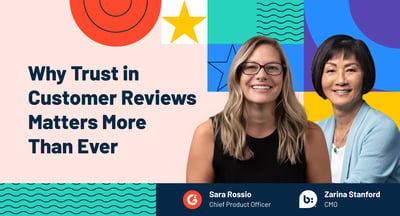June 29, 2022
 by Rachel Gianfredi / June 29, 2022
by Rachel Gianfredi / June 29, 2022

Reviews have become an important part of the purchase journey across just about every product category.
Customer reviews data tells us that 92% of consumers use online reviews to guide most of their ordinary purchasing decisions, and software is no exception. B2B buyers do plenty of research before making a purchase decision. And the vast majority of this research takes place online.
B2B shoppers specifically want to hear feedback from others who have already purchased and used the software in question.
They access this feedback by reading reviews. In an increasingly competitive market, reviews help software brands acquire new customers – and retain the ones they’ve got.
Oftentimes, the hunt for a new software solution starts with a Google search. Software brands know this – and devote time and resources to improving search rank. This makes sense: the higher the rank, the more eyes (and clicks). The average clickthrough for the first organic result in Google is 28.5%, compared to a 2.5% clickthrough for the tenth result.
The good news is, when a software brand consistently collects reviews, it positively impacts its SEO rank. And because the brand shows up higher in search results, it’s a lot easier for prospective customers to find it.
Once the buyer is aware of the brand, reviews allow them to get unbiased opinions of people who are actually using the solution. This social proof has the power to increase trust – and purchase likelihood.
As the saying goes: it’s cheaper to retain an existing customer than it is to find a new one. In addition, customer churn can cause a big hit to the bottom line. CallMiner estimates that companies in the U.S. lose about $136.8 billion each year due to customers switching to a different brand.
Consistently engaging with reviews, whether it’s by learning how to respond to negative reviews or utilizing positive review response examples, enables software brands to fix customers’ problems, improve experiences, and, perhaps most importantly, restore trust.
If a negative review is addressed to a customer’s satisfaction, they’ll have their faith in the company restored and be more likely to stick around long-term.
What’s more, every third customer who gets a response to their complaint will reformulate their review into a positive one. This positively impacts the brand’s reputation – and its ability to acquire and retain customers.
Finally, consistently monitoring and analyzing reviews on G2 and other platforms allows software brands to identify what customers love about their products and service – and what they don’t. Brands can use these insights to make data-driven operational improvements. These chances will increase customers’ satisfaction – as well as long-term loyalty.
When it comes to reviews, quantity counts, as customer review data shows that consumers expect to see 112 reviews to confirm the authenticity of a brand’s overall rating.
Plus, generating more, positive reviews will positively impact the company’s overall rating, which will improve both acquisition and retention. The customer review report also shows businesses with an average star rating between 4.0 and 4.5 earn an additional 28% in annual revenue.
But how can software brands generate more reviews?
Typically, satisfied customers are happy to share their feedback. But oftentimes, they need to be asked to do so. Asking for reviews is as simple as sending out an email and asking the customer to write a review.
Some software brands run periodic campaigns to manually ask for reviews – for example, once per quarter. These companies find that their review volume ebbs and flows throughout the course of the year.
A better approach is to consistently generate a steady stream of reviews. This leads to maximum SEO impact and ensures shoppers can always find a high volume of fresh review content which will increase their confidence and purchase likelihood.
The proven way to generate a steady stream of reviews is by automating the process of asking for reviews. A ReviewTrackers customer, Ardent Health Services, automated their review requests within their CRM system, and as a result, they’ve seen a 76% increase in review volume, with 4,266 new reviews generated.
The vast majority of those reviews (82%) have positive ratings, which is a 16% improvement. This has boosted the company’s overall rating to 4.22 stars, which has significantly improved its ability to acquire and retain customers.
Tip: Check out this guide to learn more about how to generate a steady stream of reviews.
Marketing messaging is developed to portray a product or service in the very best light – with the ultimate goal of growing sales. Reviews, on the other hand, are unbiased and written by consumers who actually have experience using the product in question.
As such, software shoppers trust reviews. Software brands must work to maintain this trust.
One important way to do this is to follow all FTC guidelines related to soliciting and pay for online reviews. For example, brands shouldn’t solicit reviews solely from those they know will leave positive reviews. And, they need to be transparent about whether the reviewer received any sort of incentive in exchange for their review (if it’s allowed at all on the specific review platform).
Failing to abide by the appropriate guidelines can have a large, lasting effect on brand reputation management strategies. For example, if it was discovered that a software brand was paying for reviews, it would tarnish the brand’s reputation. They’d likely lose existing customers – and have a hard time acquiring new ones.
The good news is, ReviewTrackers is a Google My Business partner and follows all applicable guidelines and best practices for generating reviews. One of the key benefits of G2’s partnership with ReviewTrackers is that we work together to protect your business.
It’s not enough for software brands to sit back while reviews come in. Instead, they must actively manage this content in order to see the largest impact.
A key component of managing reviews is responding to them in a timely manner. Online reviews statistics show over half (52.3%) of consumers expect a response to their review within a week. Yet, a mere 36.7% got a response from a business for their review.
An unanswered negative review leads to a frustrated customer. And a frustrated customer is likely to switch to another brand. What’s more, the lack of a response will send up red flags to prospective customers doing their research.
On the other hand, knowing how to respond to negative reviews in a timely manner provides an opportunity to resolve issues and improve customers’ experiences. This will restore the reviewers’ trust – and the likelihood that they’ll give you another chance.
In addition, responses to reviews influence future shoppers. A thoughtful, timely response lets prospective buyers know you’re a trusted brand that values feedback and prioritizes customer satisfaction, which will increase their likelihood of making a purchase.
Consistently responding to reviews can seem daunting, but ReviewTrackers makes it easier than ever to provide timely responses that restore trust and influence sales.
With ReviewTrackers, software brands can respond to G2 reviews, alongside feedback from other sources, all within a single platform. In fact, ReviewTrackers is the only reputation management provider that allows in-app responses to G2 reviews.
B2B buyers have more reputation management software options than ever before, regardless of the challenge they’re trying to address. They’re doing plenty of research prior to making a purchase decision. And that research includes seeking out feedback from peers by reading reviews.
By effectively generating and managing reviews, software brands can earn more shoppers’ trust and grow sales.
Find out how ReviewTrackers’ partnership with G2 makes it easier than ever to collect, monitor, and manage reviews within a single platform.
Modern consumers have unprecedented power to influence purchase decisions and shape a brand's...
 by Sara Rossio
by Sara Rossio
Word of mouth is just as important today as it was to buyers centuries ago.
 by Stephen Hoops
by Stephen Hoops
In case you haven’t heard, reviews are all the rage.
 by Kristen McCabe
by Kristen McCabe
Modern consumers have unprecedented power to influence purchase decisions and shape a brand's...
 by Sara Rossio
by Sara Rossio
Word of mouth is just as important today as it was to buyers centuries ago.
 by Stephen Hoops
by Stephen Hoops


